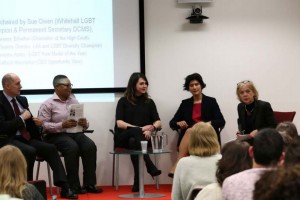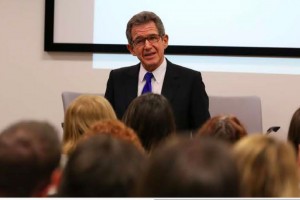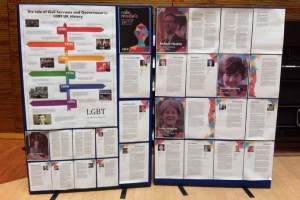
LGBT History Month has drawn to a close – and what a month it was.
I joined colleagues from across the Civil Service to celebrate the event at the Ministry of Justice. I chaired a panel discussion on authenticity in the workplace and the importance of positive role models. I was struck by something one of the panel members said, that she had been “out” at university, but felt obliged to move “back into the closet” when starting her first job. This is something that I wanted to share, as I believe we need to make much more effort in the Civil Service to be clear to those thinking of joining that we are an inclusive employer. Those of us who are straight need to be much more open allies to our LGB&T colleagues.
The Civil Service Rainbow Alliance (CSRA) network for LGB employees, and a:gender, the network for trans and intersex employees also took part in the event.
One of the speakers was Lord Browne, chair of the Tate, former chief executive of BP, and until recently the Government’s Lead Non-Executive Director. He discussed his book, “The Glass Closet: Coming out is Good Business”, and described the impact on his life and work as he tried to lead a double life, compared to the benefits of being out and open.
Role models

I could see from the faces of the audience throughout the event, and from comments made to me after, that there was a lot of inspiration in the room, and pride too. I certainly felt extremely proud hearing how lesbian, gay, bisexual and trans civil servants are doing a fantastic job serving the public and, at the same time, acting as much-needed role models for others, both inside and outside the service.
We also had a really interesting presentation on the history of legislation regarding homosexual rights (mainly about gay men), which reminded us how it is only very recently indeed that things have moved forward, albeit very significantly.
The LGBT Fast Stream Network ran an engaging and well-attended event at the Foreign & Commonwealth Office (FCO) on 24 February. Crispin Hunt MP spoke about his own experiences of being an out gay MP; and Jonathan Marshall from the FCO recounted the changes over the years in the FCO security and vetting process and how it has impacted LGB&T people.
The network also set up a display in the reception of Caxton House - headquarters of the Department for Work & Pensions - on the history of LGB&T people in the Civil Service. I was fascinated and surprised to learn that this history reaches back much further than I had realised.
“Pride” screening
Closer to home, at the Department for Culture Media & Sport, we held our Inclusion Week, where CSRA spotlighted LGBT History Month. Also, on 12 March, we screened the award-winning film “Pride”, the story of the LGBT campaigners from London who travelled to Wales to support the miners during the strike in the 1970s.
Public Health England (PHE) held a conference on 4 February called, 'Improving the health and wellbeing of lesbian, gay, bisexual and trans people and communities'. Over 280 people and 100 different organisations attended the event.
I would like to congratulate PHE and the National LGBT Partnership on developing the conference and on the innovative projects and tools launched at the event, including:
- the LGBT Research Network’s Trans healthy living factsheets
- the work with the RCN (Royal College of Nursing) on the LGBT Youth Suicide Prevention Toolkit
- PHE MSM (men who have sex with men) Action Plan as a clear commitment to action to support the public health system
Different impacts

It’s so important that we remember why we’re all here in the first place - we are here to serve our communities across the country.
Public Health England put on an event themed around the health and wellbeing of LGB&T people. The presentations contained a colossal amount of information about the good work being undertaken every day to support people who are at risk of suicide, self-harm, mental illness and sexually transmitted infections, as well as the big health issues such as stroke, heart disease and cancer.
What stood out for me from the presentations was the very different impacts on lesbians, gay men, bisexual men and women and trans and intersex people. Also, the significantly higher health risks faced by LGB&T people compared with the general population. It is sobering to be reminded that barriers exist not only in the workplace but across society as a whole. The report from the PHE conference is due to be published on 13 March. I would recommend it to one and all. The contents will be an eye opener for everyone.
I’m pleased to highlight just a few of the events and activities held for LGBT History Month 2015. But fantastic work goes on day in and day out all over the country. I for one would love to hear about other events, so please do share your own experiences.
